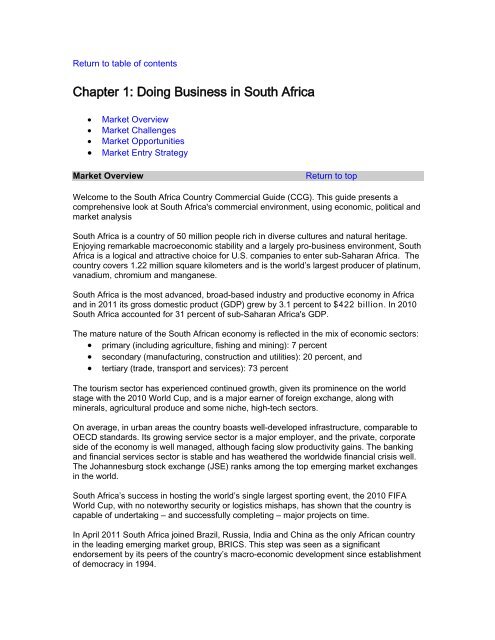South Africa - International Franchise Association
South Africa - International Franchise Association
South Africa - International Franchise Association
Create successful ePaper yourself
Turn your PDF publications into a flip-book with our unique Google optimized e-Paper software.
Return to table of contents<br />
Chapter 1: Doing Business in <strong>South</strong> <strong>Africa</strong><br />
• Market Overview<br />
• Market Challenges<br />
• Market Opportunities<br />
• Market Entry Strategy<br />
Market Overview Return to top<br />
Welcome to the <strong>South</strong> <strong>Africa</strong> Country Commercial Guide (CCG). This guide presents a<br />
comprehensive look at <strong>South</strong> <strong>Africa</strong>'s commercial environment, using economic, political and<br />
market analysis<br />
<strong>South</strong> <strong>Africa</strong> is a country of 50 million people rich in diverse cultures and natural heritage.<br />
Enjoying remarkable macroeconomic stability and a largely pro-business environment, <strong>South</strong><br />
<strong>Africa</strong> is a logical and attractive choice for U.S. companies to enter sub-Saharan <strong>Africa</strong>. The<br />
country covers 1.22 million square kilometers and is the world’s largest producer of platinum,<br />
vanadium, chromium and manganese.<br />
<strong>South</strong> <strong>Africa</strong> is the most advanced, broad-based industry and productive economy in <strong>Africa</strong><br />
and in 2011 its gross domestic product (GDP) grew by 3.1 percent to $422 billion. In 2010<br />
<strong>South</strong> <strong>Africa</strong> accounted for 31 percent of sub-Saharan <strong>Africa</strong>'s GDP.<br />
The mature nature of the <strong>South</strong> <strong>Africa</strong>n economy is reflected in the mix of economic sectors:<br />
• primary (including agriculture, fishing and mining): 7 percent<br />
• secondary (manufacturing, construction and utilities): 20 percent, and<br />
• tertiary (trade, transport and services): 73 percent<br />
The tourism sector has experienced continued growth, given its prominence on the world<br />
stage with the 2010 World Cup, and is a major earner of foreign exchange, along with<br />
minerals, agricultural produce and some niche, high-tech sectors.<br />
On average, in urban areas the country boasts well-developed infrastructure, comparable to<br />
OECD standards. Its growing service sector is a major employer, and the private, corporate<br />
side of the economy is well managed, although facing slow productivity gains. The banking<br />
and financial services sector is stable and has weathered the worldwide financial crisis well.<br />
The Johannesburg stock exchange (JSE) ranks among the top emerging market exchanges<br />
in the world.<br />
<strong>South</strong> <strong>Africa</strong>’s success in hosting the world’s single largest sporting event, the 2010 FIFA<br />
World Cup, with no noteworthy security or logistics mishaps, has shown that the country is<br />
capable of undertaking – and successfully completing – major projects on time.<br />
In April 2011 <strong>South</strong> <strong>Africa</strong> joined Brazil, Russia, India and China as the only <strong>Africa</strong>n country<br />
in the leading emerging market group, BRICS. This step was seen as a significant<br />
endorsement by its peers of the country’s macro-economic development since establishment<br />
of democracy in 1994.
















